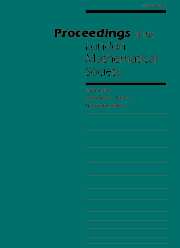Crossref Citations
This article has been cited by the following publications. This list is generated based on data provided by
Crossref.
Liu, Jianya
Wooley, Trevor D
and
Yu, Gang
2004.
The quadratic Waring–Goldbach problem.
Journal of Number Theory,
Vol. 107,
Issue. 2,
p.
298.
Liu, Jian Ya
and
Zhan, Tao
2005.
The Exceptional Set in Hua’s Theorem for Three Squares of Primes.
Acta Mathematica Sinica, English Series,
Vol. 21,
Issue. 2,
p.
335.
Wang, Ming Qiang
and
Meng, Xian Meng
2006.
The Exceptional Set in the Two Prime Squares and a Prime Problem.
Acta Mathematica Sinica, English Series,
Vol. 22,
Issue. 5,
p.
1329.
Lü, Guang Shi
and
Meng, Xian Meng
2008.
On sums of a prime and four prime squares in short intervals.
Acta Mathematica Sinica, English Series,
Vol. 24,
Issue. 8,
p.
1291.
Li, Hongze
and
Wu, Jie
2008.
Sums of almost equal prime squares.
Functiones et Approximatio Commentarii Mathematici,
Vol. 38,
Issue. 1,
Lü, Guangshi
and
Zhai, Wenguang
2009.
On the representation of large integers as sums of four almost equal squares of primes.
The Ramanujan Journal,
Vol. 18,
Issue. 1,
p.
1.
Blomer, V.
Brüdern, J.
and
Dietmann, R.
2009.
Sums of smooth squares.
Compositio Mathematica,
Vol. 145,
Issue. 6,
p.
1401.
Lü, G.
and
Tang, H.
2010.
On some results of Hua in short intervals.
Lithuanian Mathematical Journal,
Vol. 50,
Issue. 1,
p.
54.
Harman, Glyn
and
Kumchev, Angel
2010.
On sums of squares of primes II.
Journal of Number Theory,
Vol. 130,
Issue. 9,
p.
1969.
Kawada, Koichi
and
Wooley, Trevor D.
2010.
DAVENPORT'S METHOD AND SLIM EXCEPTIONAL SETS: THE ASYMPTOTIC FORMULAE IN WARING'S PROBLEM.
Mathematika,
Vol. 56,
Issue. 2,
p.
305.
Zhao, F.
2010.
Sums of almost equal prime cubes.
Acta Mathematica Hungarica,
Vol. 126,
Issue. 3,
p.
279.
Kumchev, Angel
and
Li, Taiyu
2012.
Sums of almost equal squares of primes.
Journal of Number Theory,
Vol. 132,
Issue. 4,
p.
608.
Cai, Yingchun
and
Lu, Minggao
2012.
On the slim exceptional set for the Lagrange four squares theorem.
Acta Mathematica Hungarica,
Vol. 134,
Issue. 1-2,
p.
115.
Zhao, Lilu
2014.
The additive problem with one prime and two squares of primes.
Journal of Number Theory,
Vol. 135,
Issue. ,
p.
8.
Zhao, Lilu
2014.
On the Waring-Goldbach problem for fourth and sixth powers.
Proceedings of the London Mathematical Society,
Vol. 108,
Issue. 6,
p.
1593.
Wooley, Trevor D.
2014.
On Linnik's Conjecture: Sums of Squares and Microsquares.
International Mathematics Research Notices,
Vol. 2014,
Issue. 20,
p.
5713.
Parsell, Scott T.
and
Wooley, Trevor D.
2014.
Exceptional Sets for Diophantine Inequalities.
International Mathematics Research Notices,
Vol. 2014,
Issue. 14,
p.
3919.
Kumchev, Angel
and
Zhao, Lilu
2016.
ON SUMS OF FOUR SQUARES OF PRIMES.
Mathematika,
Vol. 62,
Issue. 2,
p.
348.
Liu, Zhixin
and
Zhang, Rui
2019.
On sums of squares of primes and a k-th power of prime.
Monatshefte für Mathematik,
Vol. 188,
Issue. 2,
p.
269.
Cai, Yingchun
and
Zhu, Li
2019.
Waring-Goldbach Problem: Two Squares and Three Biquadrates.
Taiwanese Journal of Mathematics,
Vol. 23,
Issue. 5,




